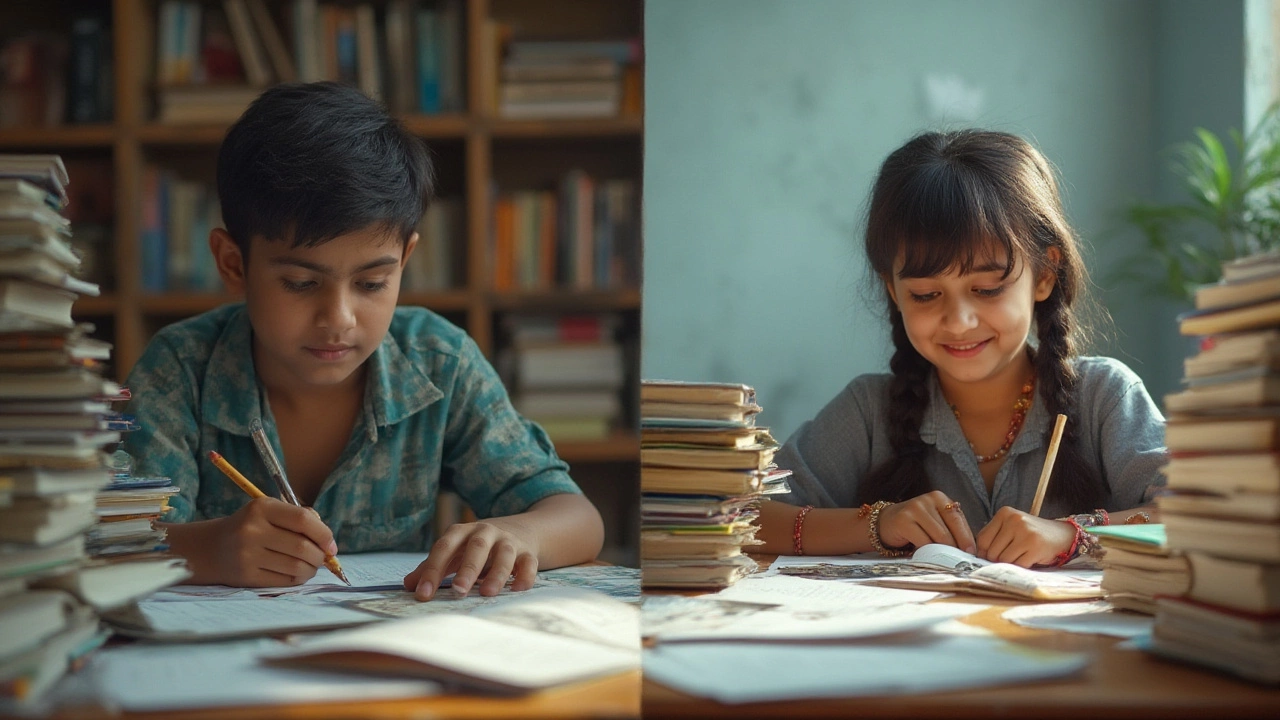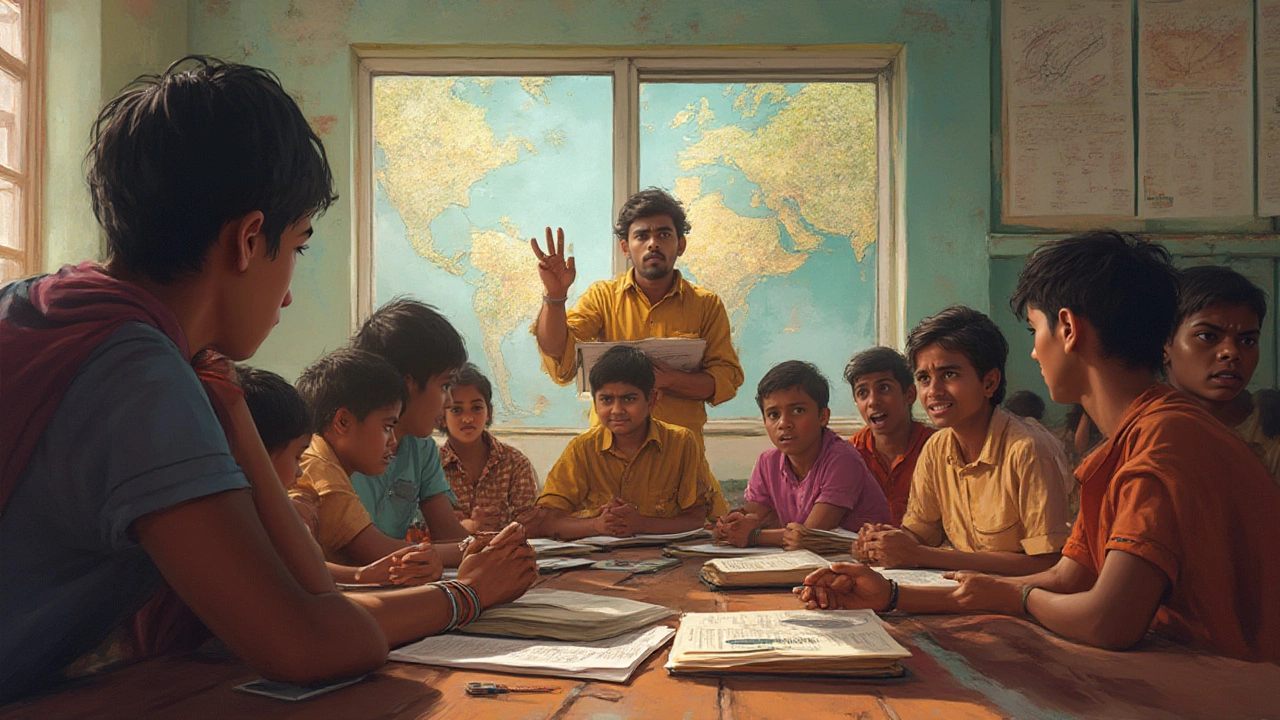If you’ve ever seen an Indian parent’s panicked face during board exam season, you know these aren’t just tests—they’re trials by fire that make or break reputations, careers, and, for some, dinner-table peace. Ask any top student, the debate about which board is the toughest—CBSE or ICSE—can split a WhatsApp group faster than a cricket match going into the final over. The answer isn’t as simple as picking whose syllabus weighs heavier in your backpack. It cuts into how you think, what you learn, and even your chances in competitive exams or universities. Who said school life is easy?
India’s Big Two: CBSE and ICSE Explained
Let’s get the basics straight. India has more than 30 educational boards, but two names always pull the most weight: CBSE (Central Board of Secondary Education) and ICSE (Indian Certificate of Secondary Education, under the CISCE). CBSE is everywhere, recognized nationally and even abroad, running over 27,000 schools as of 2024. ICSE is fewer in numbers—about 2,300—yet considered elite, with a unique, rigorous pattern.
What sets them apart? If you crack open a CBSE textbook, you’ll see the focus is tight on Science and Math, and designed for a no-nonsense, efficient run towards entrance exams like JEE and NEET. It trims off flowery content, so you get the core idea fast. ICSE, on the other hand, is like running a marathon with a loaded backpack—language-heavy, concepts taught in depth, more written work, and every subject under the sun, from Environmental Science to Arts and Commerce, gets a tough workout.
For a good view, here’s a comparison:
| Board | Schools (2024) | Subjects (Class 10) | Exam Style | Recognition |
|---|---|---|---|---|
| CBSE | 27,000+ | 6-7 main | MCQs, Short/Long Answers | National, International |
| ICSE | 2,300+ | 10+ incl. Languages | Theory, Projects, Application | Widely National, Limited Abroad |
See the scale? ICSE is almost like a boutique store—fewer students, more personal attention, and much higher expectations from every exam!
What Makes a Board ‘Tough’? Cracking Their Mythos
So, what does ‘toughest board’ really mean? Some say it’s about the syllabus—it’s longer, denser, harder. Others claim it’s about the style of exams, strict marking, or sheer volume of what you need to memorize and apply.
CBSE has this lean, mean approach. The Science and Math curriculum here is compact, but every year, they throw surprise critical thinking questions right in the middle of the paper. You can’t just mug up; you have to actually get the concepts. Plus, in 2024, CBSE increased its focus on application-based learning—think more word problems, less rote. Board toppers say the pressure is intense since thousands compete for those dream exam ranks, especially for Engineering or Medical careers. And, mistakes in one subject can tank your average fast because of the weighted marking scheme.
On the other end, ICSE students face a marathon. Their syllabus digs deep—especially languages. English is almost at par with British A-levels. Every subject (even Math or Science) expects descriptive, full-sentence answers. There’s also an emphasis on projects, lab reports, and ‘internal assessment’—each counts for a big chunk of your final grade. So, if you like writing essays or exploring topics thoroughly (but run out of time to revise), you’ll feel the ICSE heat. In a 2023 student poll, nearly 70% of ICSE kids admitted they spent 2-3 extra hours a week on schoolwork versus their CBSE friends.
Both boards demand crazy dedication. It comes down to whether your brain loves clarity and structure (CBSE), or if you thrive in creative chaos with lots of reading and discovery (ICSE).

Inside the Numbers: Syllabus Pressure, Scoring, and Exam Nerves
Let’s brush away the drama and stare at the raw data behind the toughest board in India. Check out the facts:
- CBSE boards see over 3.5 million students appear for Class 10 and 12 annually. In 2024, the Class 12 pass percentage was a solid 87.98%. You’ll find every kind of student, from urban toppers to rural first-timers.
- ICSE, despite a lower student count, sets a record for lengthy exams—10 subjects or more are normal. In 2024, the Class 10 pass rate touched 99.47%—but don’t get fooled, because only the most prepped or privileged students take this challenge.
- Grade inflation? ICSE is notorious among parents for ‘strict’ evaluation. Even a single spelling mistake can dent your score. CBSE, though less penal, doesn’t spare you in competitive subjects like Math. Students say a half-mark error feels like a landslide.
- Preparation time is key. ICSE students, on average, study 3-4 hours more weekly compared to CBSE. The difference? Less MCQ and more written work.
A cool fact: Since 2021, ICSE has made Computer Applications a core subject, giving it an edge for IT-driven careers. CBSE, however, keeps aligning its Science and Math syllabus with NEET and JEE—so if your kid is gunning for an IIT, CBSE is still a favorite.
And the strain isn’t just for students. Teachers in both boards face unique struggles. CBSE teachers must tackle frequent syllabus changes (like the new National Education Policy tweaks). ICSE teachers spend much more time on corrections and project guidance. Both face parent pressure—a lot of it!
Tough Survives: Tips and Real-Life Success Stories
What’s the secret sauce for surviving—and thriving—under the toughest boards in India? It’s not just about grinding harder. Smart prep equals victory.
- If you’re in CBSE, focus on sample papers and understand marking patterns. The board loves clarity and crispness. Break up answers with points, not paragraphs. For Science or Math, use diagrams and flowcharts—they fetch marks fast.
- For ICSE, get comfortable with writing—practice essays, summaries, and explanations. Never ignore internal assessments; your project marks can save you if you slip up in the final theory exam. And read widely—ICSE pulls out-of-the-blue questions, especially in English and History.
- Time management is king. ICSE students swear by the Pomodoro technique (25 minutes study, 5 minutes break), while CBSE toppers create strict slot timetables with daily revision blocks. Pick the style that fits your brain best. Consistency over last-minute panics—the cliché is true.
- Mental health matters. ICSE and CBSE both pile up expectations. A 2023 Mumbai-based survey by MindPehel found over 60% of Class 10-12 students from top boards reported exam anxiety. Find your stress busters—runs, mindful breathing, or shutting down your phone for a few hours.
- Peer pressure can motivate but also crush. Tune out the race and focus on your growth. Most toppers have trusted mentors or support groups—don’t shy away from asking for help.
If you need inspiration, look at ISRO’s P. Veeramuthuvel, project director of Chandrayaan-3 and an ICSE graduate, who credits his love for interdisciplinary subjects to his board. Or Sushant Singh Rajput, a CBSE student turned Bollywood star, who said board pressure actually trained him for auditions and bigger challenges.
And hey, your board doesn’t lock your future. It’s what you make of it—both are tough, rewarding, and unique in their own ways. Pick one that matches your ambitions, and you’ll end up tougher than the test itself.
